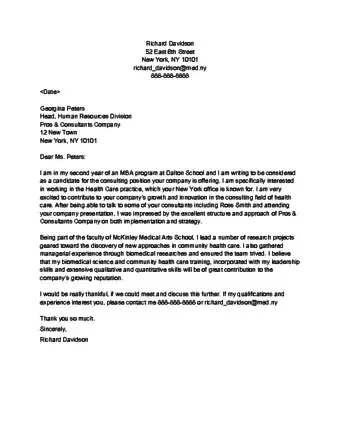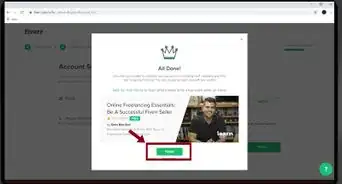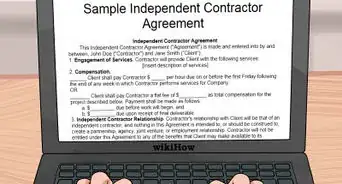This article was co-authored by Michael R. Lewis. Michael R. Lewis is a retired corporate executive, entrepreneur, and investment advisor in Texas. He has over 40 years of experience in business and finance, including as a Vice President for Blue Cross Blue Shield of Texas. He has a BBA in Industrial Management from the University of Texas at Austin.
There are 12 references cited in this article, which can be found at the bottom of the page.
wikiHow marks an article as reader-approved once it receives enough positive feedback. In this case, 82% of readers who voted found the article helpful, earning it our reader-approved status.
This article has been viewed 158,361 times.
A business consultant develops strategies to help businesses restructure, improve marketing, and become more profitable. In order to become a business consultant, you'll need to to obtain a degree and obtain certain experiences and skills along the way. In this article, we'll walk you through how to get the education, certifications, and skill set you need to follow this rewarding career path.
Steps
Getting an Education
-
1Start with high school. While in high school, consider taking classes in business and business management if your high school offers them. You can also join clubs with other like-minded students to help gain experience.
- One club related to your field is the Future Business Leaders of America, a nationwide club that likely has a chapter at your school. If it doesn't, you can start your own chapter. In fact, this organization has clubs that run from middle school to university level.[1]
- Take concurrent classes. If your school doesn't offer business classes, see if you can take concurrent classes at a local community college. Talk to your guidance counselor about concurrent classes.
-
2Get a bachelor's degree. If you're going to work as a business consultant, you'll at least need a bachelor's degree. While some companies may hire you without a degree, to build a solid business as an independent consultant, you'll need at least a bachelor's degree in business or business management.
- While at university, find the local chapter of the Future Business Leaders of America. Joining your local chapter can help you gain experience and meet other people who want to go into your field.
- Most management consulting firms today, excluding IT consultants, require an MBA for employment.
Advertisement -
3Decide on a specialty. At some point, you'll need to decide what you would like to specialize in. What you specialize in is up to you, but it can determine what positions you get or what kind of business consulting you run.
- Some specialties you might consider include sales, management, administration, and human resources. You might also look at IT systems, accounting, finance, projects, and organizational and corporate. Some people focus solely on marketing, as well.
- To help determine your specialty, consider taking classes in the areas you're interested in. That way, you can see what you have a passion for.
-
4Consider a master's degree (MBA). While a MBA isn't strictly necessary, it can help you stand out in your field. A master's degree in business, business administration, or a related field is a good idea. Beyond helping you stand out, it will help you gain greater expertise so that you can be good at what you do.[2]
- If you're looking at a specialty, try to find a program that lets you specialize in that area. Many programs have a master's degrees in very specialized areas or ones that will let you focus on a more general degree.
-
5Gain skills on the job. After graduating school or between semesters, you should seek a consulting internship or work as a consultant trainee, as the field is highly restrictive at the top levels. Having experience with a well-known employer is often more important than your education or certifications. Work with your school's career development office to locate and apply for these positions.
- Having this type of background is especially important if you plan to work for a major consulting firm that works with Fortune 500 companies.
Getting Certification
-
1Find the appropriate certification. In the business consultant field, the certification is based on your specialty. For instance, if you want to work with small businesses, you'll likely get your certification with the Association of Accredited Small Business Consultants. On the other hand, if you're going into the health field, you'll likely get your certification through the National Society of Certified Healthcare Business Consultants.
- You can get a more general certification. For instance, the Institute of Certified Business Consultants offers a certification as a general business consultant.
-
2Complete work experience requirements. In some cases, you will need to have a certain amount of experience in the field before you can gain certification. For instance, the Institute of Certified Business Consultants requires that you have 3 years of experience before you can become certified.
-
3Spend time training. With most certifications, you will need to spend time reading or training. In some instances, you just take a review course before taking the exam. Often, this training or review is done at your own pace, as you work through materials and tutorials to learn the information.
-
4Take an exam. Most of the time, certification will require that you take an exam at the end of the course. In fact, the exam is often the primary focus of the certification process. Usually, you can take the exam online to gain your certification, but you may be required to visit a testing center for certification.
- Often, the exam will take a good chunk of time, such as half a day or more, so you will need to set aside time to take it.
- Both the course and the exam will cost a fee, set by the organization.
-
5Complete the application. With some certification, you will also need to fill out an application packet to become certified. Once you've met the basic requirements, you request the packet or fill it out online. Then you send it in to be reviewed by the organization.
- Certification usually requires that you complete the course and take the exam in a certain amount of time. For instance, the National Society of Certified Healthcare Business Consultants wants you to finish the course and the exam within 90 days.
Developing the Right Skills
-
1Work on your critical thinking and problem solving skills. As a business consultant, you'll be called in to work on problems in the company, which means that you need to find creative solutions to hard problems. To be effective, you need to use critical thinking and problem solving regularly to solve problems.[3]
- Start by learning the basics of critical thinking. For instance, it's important to learn to ask questions and don't make assumptions about the problem. If one solution has always been seen as the only solution, ask why. Think about other ways you could approach the same problem.
- Use evidence. When you're thinking critically and problem solving, you need to have data and evidence to make a decision. It's not about just pulling a decision out of thin air.
- Spend time using your critical thinking skills in everyday life. For instance, when you're looking at a news story, take time to evaluate the source of the story. Look at the data. Are they skewing it to make a point?
-
2Develop communication skills. Communication skills are essential in almost any field, but they are especially important in a field where you are selling yourself all the time to businesses. One of the best ways you can improve your oral communication skills is to work in retail.[4]
- It's also important to to take communication classes in college, such as speech, debate, or business writing. They can help you develop your communication skills.
- Make a point to work on your communication in everyday conversation. For instance, pay attention to how fast you're speaking and try to speak slowly. Also, make sure you are enunciating your words and speaking at an appropriate volume in any group you're in. If you're not sure what you sound like, consider recording yourself and listening to the recording.
- It's also important to actively listen in any given communication. If you're listening, you can respond to what the person is actually saying, which makes the person feel important, a quality you want when you're trying to sell yourself or your business.
-
3Be a leader. Often in business consulting, you will be working on your own, even if you are a part of a larger consulting company. However, when you go into a business, you will need to be a leader, as that business will be looking to you to help improve the way it works.
- One way you can improve your leadership skills is to run for leadership positions while you are in college and high school.
- Go out for student council. Run for a leadership position in Future Business Leaders of America. These positions will help teach you leadership skills.
-
4Work on your organizational skills. When working as a business consultant, you'll likely need to manage more than one business at once. Because you're working on several businesses and multiple projects, you have to be extremely organized.[5]
- One way to be organized is to use the tools at your disposal. Email organization, online calendars, and other project management tools can be a big help.[6]
- Another way to work on organization is to develop your own systems, so that your files are organized in such a way that you can always find them.
-
5Be able to work to a deadline. Business consultants often must meet tight deadlines to cater to their clients' needs. Therefore, you must be able to work under stress and to deliver the work when you saying you're going to do so.[7]
- Going to college is actually fairly good preparation for working on a deadline, since you must manage several classes at once and turn in your work on time. However, when you get out in the world, your job will often depend on you making those deadlines.
-
6Be prepared for long hours. The U.S. Bureau of Labor Statistics estimates that about a third of management analysts, a subset of business consultants, works more than 40 hours a week. That means you'll need to be prepared to put in long hours, especially when you're first starting out.[8]
- This position will also usually require you to travel because most of the time, you won't just be working with businesses in your area. Because much of your work is done with the client at their place of business, you'll need to travel to where they are.
Working as a Consultant
-
1Consider an internship. An internship is a great way to gain experience, and you can even do one while in school. Many businesses, even consulting companies, offer internships to help people get their feet wet in the business.[9]
- Check with your school to see if they know of any internships in the area, as businesses often contact local schools.
- You can also look for internships on traditional job search websites.
-
2Build up your network. Networking is critical to being a consultant. For one, it can help you get hired by a consulting company. However, it's also necessary to build up a network of people who own their own business or are high up in their company, as those are the people who are likely to hire you for consulting.[10]
- Attend local meet and greets in your area for young entrepreneurs. You should also attend meetings and social events held by your local chamber of commerce.
- As you meet people, strike up conversations. When you find someone you click with, ask for their contact information. Be sure to follow up with them later.
- For example, you can shoot them an email talking about your meeting, saying something like, "Hi Josh, It was great to meet you the other day at that networking event. I was glad to find another Sooner fan in the area. There aren't many of us! Call me if you want to have drinks sometime."
-
3Find jobs in your area. To get started in the field, look for entry-level jobs at business consulting firms in your area. You can use standard job search engines like Indeed, Jobs.com, Yahoo, or Monster.
- You can also use job listings associated with any clubs or national organizations you belong to.
- Don't forget to hunt down specific firms. Sometimes, they will list postings on their sites first.
-
4Apply for appropriate positions. Pick jobs that cover your specialties. You'll have an easier time selling your skills to the company if your skills are a perfect fit. However, you may need to take a position that's slightly out of your skill set when you're entering the field. For instance, some business or management consultants start out elsewhere in a company, such as working in human resources or working their way up into management positions.[11]
- Of course, part of the job interview process is showing how your skills are a perfect fit for the position.
- One way to show how you're perfect is to tailor your resume and cover letter to the position you're applying for by highlighting your relevant skills and experience.
-
5Open your own consulting business. Another option is to go into business for yourself. As a small business owner, you could even work out of your home to get started, meeting with clients at their offices or at local coffee shops. You may want to be working somewhere else while you set up your business, as early on, you may not have much cash flow.
- Before opening your own business, know that opening a consulting business before gaining actual experience can be difficult, since experience translates into credibility a client's mind. You may want to gain experience and a reputation first before going out on your own.
- When setting up your business, consider all the things you do for someone else, such as writing a mission statement, creating a website, making a marketing plan, and creating a business plan.[12]
- Decide on the legal aspects of your business. You can open a limited liability business, where your business is partially separated from your personal finances when it comes to responsibilities for debt. A sole proprietorship is easier to set up, but you are personally responsible for any debt the company accrues.
- Pay for the help you need. If you need legal advice about how to set up your business, hire a lawyer. If you don't understand business accounting, hire a CPA.
- Don't forget to check your local laws to see what licenses you need to own your own consulting business.
-
6Put in the hours. As a young consultant, you'll need to put in extra hours to bring in clients, as well as to meet all the demands of a very demanding job. You'll be working in a high-stress situation where you must be able to solve problems very quickly and in a turnaround time that you and the client determine together. In addition, if you're working for yourself, you're going to be under more pressure since you can't ask for help from others in your company if you run into trouble.[13]
- Marketing and selling is not a paid activity; only consulting brings in revenue. You will need to estimate how many hours you will actually work (and be paid) in a year to establish your billing rate. Your billing rate must be competitive with other consultants that may have a higher ratio of work to marketing hours.
- Be prepared for the fact that some clients will want to set unrealistic deadlines. If you're on you're own, you'll need to be realistic with the client, as telling them you can meet a deadline you can't isn't good for either of you.
- If you're in a firm, ask about company policy for deadlines. It may be that the company will back you up if they have a policy in place about how short a deadline can be set.
-
7Market yourself to organizations. As a consultant, it will be your job to bring in clients, whether for your own business or for a lager consulting company. That means that you have to sell yourself and your skills to that business. Often, that's where your network comes in. You have to convince the people in your network that they need your help to act as a catalyst for their company or to fix problems that arise.[14]
- Another way you can sell yourself is to show you can save them money. That is, if they bring you in when needed, they don't need to hire a full-time analyst in their company. You might also be hired to help train employees and management in certain skills or figure out why sales aren't going up.
- Make sure you are putting your name out there through a marketing plan. You should have a web presence, including a website with testimonials if possible.
- It also doesn't hurt to cold call businesses. That is, visit businesses in the area and greet the people who work there, letting them know your services are available should they need them.[15]
Sample Resume
References
- ↑ http://www.fbla-pbl.org/
- ↑ http://www.bls.gov/ooh/business-and-financial/management-analysts.htm#tab-4
- ↑ http://collegeinfogeek.com/improve-critical-thinking-skills/
- ↑ http://fabjob.com/program/become-business-consultant/
- ↑ https://www.business2community.com/strategy/build-project-management-skills-0720392#CJJ6ARfwH5R6g4KP.97
- ↑ https://www.business2community.com/strategy/build-project-management-skills-0720392#CJJ6ARfwH5R6g4KP.97
- ↑ http://www.bls.gov/ooh/business-and-financial/management-analysts.htm#tab-3
- ↑ http://www.bls.gov/ooh/business-and-financial/management-analysts.htm#tab-3
- ↑ http://fabjob.com/program/become-business-consultant/
- ↑ https://www.entrepreneur.com/article/41384
- ↑ http://www.bls.gov/ooh/business-and-financial/management-analysts.htm#tab-4
- ↑ http://www.passionforbusiness.com/articles/be-a-small-business-consultant.htm
- ↑ http://www.bls.gov/ooh/business-and-financial/management-analysts.htm#tab-3
- ↑ https://www.entrepreneur.com/article/41384
- ↑ http://www.inc.com/scott-steinberg/how-to-build-a-consulting-business.html










-at-Home-Step-10.webp)







-Step-9.webp)


































































